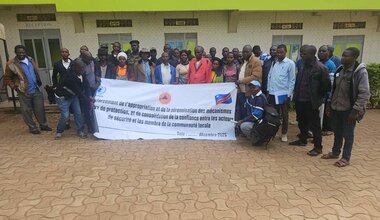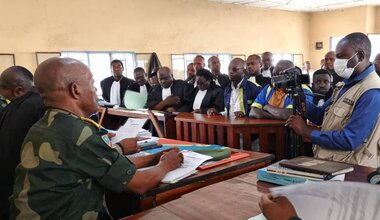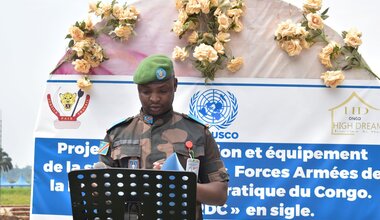Combating sexual violence: In North Kivu and Ituri, mobilization adapted to new risks
This year, the 16 Days of Activism highlighted an often silent reality: the rise of digital violence in Beni and Bunia. These forms of violence, observed by protection actors, take the form of intimidation, blackmail, or distribution of intimate images. They add to the sexual violence already reported for several years. Faced with this evolution, women are more visible in public spaces and men are beginning to engage around positive masculinity, with support from MONUSCO and local partners.

In Beni, more than five hundred people, including about one hundred men, participated in awareness-raising activities organized by MONUSCO, the Gender Section, and women's associations. Discussions focused on victim protection, case reporting, and responsible use of digital technology. Kahindo Safi Mughole, from the Women Lawyers Network, emphasized that a survivor's testimony can sometimes protect others.
Toward digital awareness
The international theme of this edition, "Unite to End Digital Violence Against All Women and Girls," served as the framework for discussions. For Emery Chibi, from the Gender Section at MONUSCO Beni, prevention cannot happen without men. According to him, positive masculinity means assuming collective responsibility in protecting women and girls. In Bunia, awareness-raising also incorporates the legal aspect. For his part, Alain Rubenga, from the Gender Section at MONUSCO Bunia, emphasizes that knowledge of national digital law helps limit abuses and impunity.
According to the consolidated reports from the provincial division of Gender, Family, and Child, over twenty-seven thousand cases of gender-based violence were documented in Ituri between January and November 2025. This data concerns people of all ages and confirms the need for a tailored, on-the-ground response. Displacement zones and urban areas are particularly affected, according to local authorities.

Continuous support for local actors
MONUSCO supports administrative and community structures through joint patrols with security forces, training on investigations and human rights, and judicial support, including mobile court hearings. Quick Impact Projects strengthen women's economic empowerment and facilitate access to essential services. Women's Houses (Maisons de Femmes) have been built in Getty and Mambasa. In Kilya, Paida, Oicha, and Mutwanga, rehabilitated infrastructures now house services for women, youth, and local associations. The zero-tolerance policy against sexual exploitation and abuse is systematically reiterated.
Observed effects on the ground
In certain stabilized zones, local organizations report a decrease in sexual violence and a reduction in informal dispute resolution. Girls' schooling is progressing, and several groups of displaced women have launched economic activities, notably soap making in Rhoe and Drodro. An activist met in Bunia summarizes the challenge: an educated and autonomous woman has more means to ensure her rights are respected.
In North Kivu and Ituri, the fight against sexual violence is progressively changing. Field actors emphasize the need to integrate the digital dimension into prevention mechanisms, strengthen the judicial response, and consolidate community mobilization so that every space, including virtual ones, becomes a place of protection rather than a risk factor.

 UN
UN United Nations Peacekeeping
United Nations Peacekeeping






